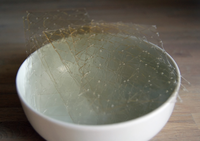
Photo from wikipedia
In this study, a collagen hydrogel using collagen exclusively produced in Romania, was obtained by electron beam (e-beam) crosslinking. The purpose of our study is to obtain new experimental data… Click to show full abstract
In this study, a collagen hydrogel using collagen exclusively produced in Romania, was obtained by electron beam (e-beam) crosslinking. The purpose of our study is to obtain new experimental data on the crosslinking of collagen and to predict as faithfully as possible, its behavior at high irradiation doses and energies. To pursue this, the correlations between macromolecular structure and properties of collagen hydrogels were determined by rheological analysis, Fourier Transform Infrared Spectroscopy (FTIR), Scanning Electron Microscopy (SEM), and Differential Scanning Calorimetry (DSC), respectively. The gel fraction, swelling degree, and network parameters of the collagen hydrogels were also investigated at different irradiation doses. Through experimental exploration, we concluded that irradiation with e-beam up to 25 kGy induces crosslinking processes in collagen structure without producing advanced degradation processes. E-beam technology is a great method to develop new materials for medical applications without adding other chemical reagents harmful to human health. The future aim is to develop new wound dressings for rapid healing based on collagen, through irradiation technologies.
Journal Title: Materials
Year Published: 2022
Link to full text (if available)
Share on Social Media: Sign Up to like & get
recommendations!